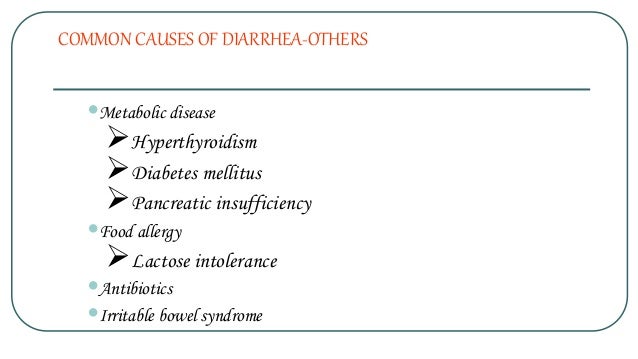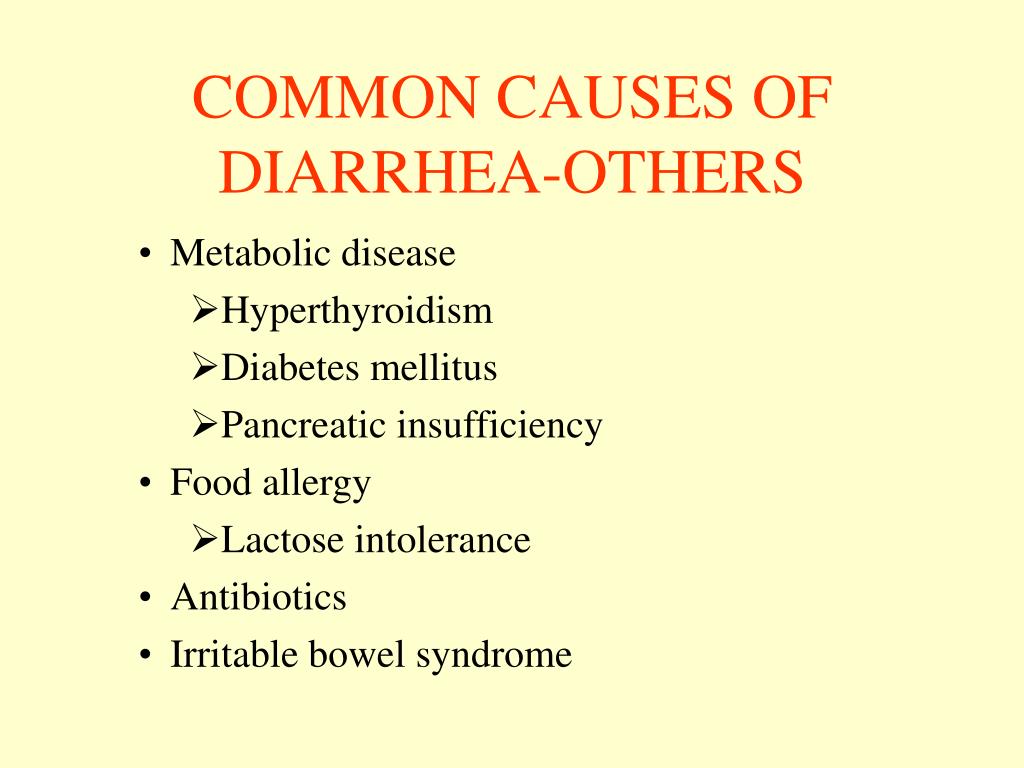How Does Diabetes Cause Diarrhea
Diabetic diarrhea is likely the result of longterm high blood sugar levels damaging the nerves and overall function within your colon, small intestines, and your stomach .
Many gastrointestinal complications of diabetes seem to be related to dysfunction of the neurons supplying the enteric nervous system, explains the 2000 edition of Clinical Diabetes.
When the nerve fibers throughout your digestive system are damaged, this can result in constipation or diarrhea at different times because some nerves stimulate movement and other nerves help to slow movement in your intestines.
The bouts of diarrhea can be ongoing or they can persist for a few months and then quiet down for a few months. The phases of diarrhea can also be countered with phases of constipation, too.
Another possible cause of diabetic diarrhea is that people with diabetes are more likely to consume large quantities of artificial sweeteners and sugar alcohols, which are known to be potent laxatives.
How Do You Stop Diarrhea While Having Diabetes
Diarrhea treatment depends on the cause. Once the cause is determined, the treatment is prescribed by the doctor. If diabetic diarrhea is caused by nervous system damage, it can be difficult to treat.
Managing high blood glucose levels can help to prevent further damage and diarrhea. If the underlying cause for irregular and painful bowel movements is bacterial overgrowth.
The treatment will aim to reduce the number of bacteria in the body. This will allow your body to heal. Continue reading to learn more.
How To Keep Your Diabetes Under Control
Diabetes is a chronic hormonal disease, which causes high levels of sugar in the blood. It is a result of either the lack of insulin, a hormone produced by the pancreas, or your body’s inability to respond to this hormone. High blood sugar levels caused by the lack of this hormone is called type 1 diabetes. It is a genetic condition caused by faulty genes that make this chemical and affects mostly young adults and teenagers. When your blood sugar levels escalate due to the failure of response to this hormone,it is known as type 2 diabetes. Here are some tips to keep diabetes under control.
# Monitoring
Checking blood sugar levels at home is crucial to figure out your changing need for insulin or medicines. You need to monitor it several times a day at home. A device known as a glucometer is used to do so. There are also more sophisticated devices like continuous glucose monitoring systems to help you keep a track of your blood sugar levels. This system can be attached to your body to take blood sugar readings every few minutes.
# Healthy Eating
# Exercising
Regular workouts improve your body’s ability to use insulin. Exercising at least 30 minutes a day for 5 days a week is good for people living with diabetes. Regular workouts become all the more important if you are overweight. They improve blood circulation and reduce the risk of associated complications like heart diseases, nerve damage, etc.
Also Check: Diabetes Medication With Least Side Effects
What Causes People With Diabetes To Get Diarrhea
The cause for the connection between diabetes and diarrhea isnt clear, but research suggests that neuropathy may be a factor. Neuropathy refers to numbness or pain resulting from nerve damage. If you have diabetes, high blood sugar levels can damage your nerve fibers. This generally occurs in the hands or feet. Issues with neuropathy are common causes for many of the complications that accompany diabetes.
Another possible cause is sorbitol. People often use this sweetener in diabetic foods. Sorbitol has proven to be a potent laxative in amounts as small as 10 grams.
An imbalance in your enteric nervous system can also cause diarrhea. Your ENS regulates the functions of your gastrointestinal system.
Researchers have also looked at the following possibilities:
- bacterial overgrowth
- fecal incontinence resulting from anorectal dysfunction
- Celiac disease
Genes And Family History

As in type 1 diabetes, certain genes may make you more likely to develop type 2 diabetes. The disease tends to run in families and occurs more often in these racial/ethnic groups:
- African Americans
- Native Hawaiians
- Pacific Islanders
Genes also can increase the risk of type 2 diabetes by increasing a persons tendency to become overweight or obese.
Also Check: Metformin Joint Pain Side Effects
Metformin Side Effects In People Assigned Female At Birth
As just discussed, common metformin side effects should be the same regardless of gender. However, there is a condition under which people who menstruate may notice a different side effect than people who dont. Lets take a closer look below.
Metformin is sometimes used as an off-label treatment for polycystic ovary syndrome . Depending on what symptoms youre experiencing and other medical conditions you have, metformin could be used as a first- or second-choice medication. One symptom this medication can be effective for is regulating monthly bleeding.
Small studies have shown that metformin helps between 50% and 70% of people with irregular bleeding. That being said, its possible that taking metformin could change the frequency of your monthly bleeding if you have PCOS and havent gone through menopause. While this is the intended effect of using metformin to treat PCOS, it could come as a surprise if youre not expecting it.
How can I avoid or alleviate the side effects of metformin?
Considering the most common side effects of metformin impact digestion, you may be able to alleviate side effects in the following ways:
-
Consider taking metformin with a meal.
-
Try an extended-release version.
-
Avoid sudden dietary changes.
For most people, these side effects of metformin resolve within a few weeks and only occur when you first start the medication or when your dose is raised.
Early Signs Of Diabetes
Both types of diabetes have some of the same telltale warning signs.
- Hunger and fatigue. Your body converts the food you eat into glucose that your cells use for energy. But your cells need insulin to take in glucose. If your body doesn’t make enough or any insulin, or if your cells resist the insulin your body makes, the glucose can’t get into them and you have no energy. This can make you hungrier and more tired than usual.
- Peeing more often and being thirstier. The average person usually has to pee between four and seven times in 24 hours, but people with diabetes may go a lot more. Why? Normally, your body reabsorbs glucose as it passes through your kidneys. But when diabetes pushes your blood sugar up, your kidneys may not be able to bring it all back in. This causes the body to make more urine, and that takes fluids. The result: You’ll have to go more often. You might pee out more, too. Because you’re peeing so much, you can get very thirsty. When you drink more, you’ll also pee more.
- Dry mouth and itchy skin. Because your body is using fluids to make pee, there’s less moisture for other things. You could get dehydrated, and your mouth may feel dry. Dry skin can make you itchy.
- Blurred vision. Changing fluid levels in your body could make the lenses in your eyes swell up. They change shape and canââ¬â¢t focus.
Don’t Miss: Is Metformin Dangerous To Take
What Causes Diabetic Ketoacidosis
The main cause of DKA is not enough insulin. A lack of insulin means sugar cant get into your cells. Your cells need sugar for energy. This lack of insulin causes your bodys glucose levels to rise. To get energy, your body starts to burn fat. This process causes ketones to build up. Ketones can poison the body.
High blood glucose levels can also cause you to urinate often. This leads to a lack of fluids in the body .
DKA can be caused by missing an insulin dose, eating poorly, or feeling stressed. An infection or other illness can also lead to DKA. If you have signs of infection , contact your doctor. You will want to make sure you are getting the right treatment. For some people, DKA may be the first sign they have diabetes.
Prevalence Of Diabetic Diarrhea
While the prevalence of diabetic diarrhea will depend on the area being evaluated, it is estimated that type 1 diabetics have a higher rate of associated diarrhea compared to type 2 diabetics, with rates of five percent and 0.4 percent respectively. Diabetic diarrhea tends to be associated with disease duration, A1c levels, being a male, and autonomic neuropathy.
Recommended Reading: Are Overnight Oats Good For Diabetics
Simplesteps To Improve Your Digestive Health
Digestive issues as people with diabetes are common but there are so many things you can do to prevent and protect yourself, starting with improving your blood sugar levels, eating a diet consisting of mostly whole foods, and getting regular exercise.
Dont forget to nix the cigarettes and keep alcohol beverages limited to a few times a week rather than every night.
Like many aspects of diabetes health, improving and protecting your digestion comes down to the simplest habits and choices we make every day.
Suggested next posts:
If you found this guide to diabetic diarrhea useful, please sign up for our newsletter using the form below. We send out a weekly newsletter with the latest posts and recipes from Diabetes Strong.
Digestive Ailments Are Common In Those With Diabetes
In a study published in 2018, researchers asked 706 individuals with type 1 diabetes, and 604 individuals without diabetes, a series of questions about their gastrointestinal symptoms and quality of life.13 They found that lower gastrointestinal symptoms â including constipation, diarrhea, abdominal pain, bloating, intestinal gas, and floating stools â were much more common in the individuals with diabetes, especially diarrhea and constipation, which were twice as likely in those with diabetes. These symptoms were associated with lower quality of life and poor glycemic control. However, the researchers were able to identify, and treat accordingly, the cause of diarrhea in 72% of cases, leading to a better outcome for the patients. If you have diabetes and experience digestive symptoms, make sure to let your health care team know so that you can work together to manage these symptoms.
Also Check: Metformin Initial Dose
Food Choices And Gut Health
Many individuals with diabetes choose to consume artificially sweetened treats in lieu of those containing sugar. However, it is important to note that a certain type of artificial sweetener, known as sugar alcohols, can cause diarrhea. These include erythritol, sorbitol, maltitol, and xylitol in general, look for products that contain ingredients that end in âitolâ. Avoid large quantities of these products to reduce diarrhea.
In addition, some individuals with diabetes might limit overall carbohydrate intake, which can make it difficult to consume enough fibre. Dietary fibre is vital to a well-functioning gut, and not getting enough can lead to constipation or diarrhea. Beyond maintaining healthy bowel function, some research shows that fibre might help to regulate blood sugar levels by slowing digestion and by modifying gut bacteria.12
Whats The Difference Between Signs Vs Symptoms Of Type 1 Diabetes

Type 1 diabetes symptoms are experienced by a person with diabetes, but signs of type 1 diabetes can also be noted by friends and family even if the person who is having the symptoms may not notice them or may be unable to communicate because they are in the throes of diabetic ketoacidosis. Common signs of T1D to watch out for include:
- Weight loss, despite eating more
- Changes to menstruation
- Rapid heart rate
- Reduced blood pressure
- Low body temperature
- Acting or seeming drunk while sober, which is a sign of diabetic ketoacidosis
- Breath that is fruity or smells like nail polish remover which is another sign of ketosis
- Chronic skin infections
You May Like: What Is The Lowest Dosage Of Metformin
Emergency Situations In Diabetic Dogs
In diabetic dogs, the following emergency situations may arise: Hypoglycaemia – extremely low blood sugar Diabetic ketoacidosis or hyperglycaemic hyperosmolar non-ketotic syndrome HHNK syndrome) – caused by extremely high blood sugar It is important to be prepared for the above situations if you own a diabetic dog. CONTACT YOUR VETERINARIAN IMMEDIATELY for possible adjustment of the insulin dose or treatment of additional medical problems if your diabetic dog shows any of these signs: Excessive drinking for more than 3 days Excessive urination or inappropriate urination in the house for more than 3 days Reduction in or loss of appetite Weakness, seizures or severe depression Behavioural change, muscle twitching or anxiety Constipation, vomiting or diarrhoea Signs of a bladder infection Swelling of the head or neckContinue reading > >
Be Aware Of Low Blood Sugar
While the risk of severe hypoglycemia is low, it is possible, especially if you take multiple diabetes medications. Its always a good idea to have glucose tablets or gel with you just in case. These can help raise your blood sugar levels. Everyone experiences hypoglycemia in different ways, but common symptoms include:
-
Shakiness
-
Headache
Recommended Reading: Does Glipizide Lower Blood Sugar Immediately
Small Intestinal Bacterial Overgrowth
In the healthy small intestine there are usually some normal bacteria , but in diabetes, due to changed intestinal motility, they may overgrow, and cause bloating and diarrhea.
Diagnosis of SIBO is with a breath test. SIBO is treated with antibiotics, and Metclopropamide and cisapride may help to accelerate the passage of fluids through the small intestine, thus preventing the SIBO itself .
Gastrointestinal Complications Of Diabetes
AMER SHAKIL, MD, ROBERT J. CHURCH, MD, and SHOBHA S. RAO, MD, University of Texas Southwestern Medical Center at Dallas, Dallas, Texas
Am Fam Physician. 2008 Jun 15 77:1697-1702.
Patient information: See related handout on gastroparesis, written by the authors of this article.
Gastrointestinal complications of diabetes have become more common as the rate of diabetes has increased. These complications and their symptoms are often caused by abnormal GI motility, which is a consequence of diabetic autonomic neuropathy involving the GI tract. Although some studies have indicated that diabetic autonomic neuropathy is linked to the duration of diabetes, the Diabetes Control and Complications Trial suggested that, at least in persons with type 1 diabetes, neuropathy and other GI complications are associated with poor blood glucose control and not necessarily the duration of diabetes.13 GI conditions caused by diabetes include gastroparesis, intestinal enteropathy , and nonalcoholic fatty liver disease.
Also Check: Somatostatin Diabetes
How Often Should I Take Metformin
Normally, metformin ER is only taken once a day. Metformin IR and liquid metformin are usually taken multiple times a day.
If you do start taking metformin, how often you take it and your dose will depend on how you respond to it. Your healthcare provider should ask you for follow-up bloodwork in about 3 months to see if they should change your dose.
If you dont follow the dosage instructions for metformin, it can lower the effectiveness of the medication and also make you more susceptible to side effects.
Try to take metformin at approximately the same time every day. If you miss a dose, take it as soon as you remember. But if its almost time for your next dose, skip the dose you missed. Never double up on a dose to make up for missed doses.
Symptoms Of Type 1 Diabetes
You might notice:
- Unplanned weight loss. If your body can’t get energy from your food, it will start burning muscle and fat for energy instead. You may lose weight even though you haven’t changed how you eat. See which foods are high in trans fatty acids.
- Nausea and vomiting. When your body resorts to burning fat, it makes ketones. These can build up in your blood to dangerous levels, a possibly life-threatening condition called diabetic ketoacidosis. Ketones can make you feel sick to your stomach.
You May Like: Symptoms Of High A1c
Does Metformin Cause Diarrhea
Many people with type 2 diabetes use the medication metformin to help control their blood sugar. Diarrhea is a common side effect when a person first begins taking metformin. Occasionally, people will experience chronic diarrhea after theyve been on the medication for a long time, even years.
If you are a type 2 diabetic on metformin who is experiencing chronic diarrhea, talk to your healthcare provider about whether there are other options available to help control your blood sugar.
Acute And Persistent Diarrhea

The most common causes of acute and persistent diarrhea are infections, travelers diarrhea, and side effects of medicines.
Infections
Three types of infections that cause diarrhea include
-
Viral infections. Many viruses cause diarrhea, including norovirus and rotavirus. Viral gastroenteritis is a common cause of acute diarrhea.
-
Bacterial infections. Several types of bacteria can enter your body through contaminated food or water and cause diarrhea. Common bacteria that cause diarrhea include Campylobacter, Escherichia coli , Salmonella, and Shigella.
- Parasitic infections.Parasites can enter your body through food or water and settle in your digestive tract. Parasites that cause diarrhea include Cryptosporidium enteritis, Entamoeba histolytica, and Giardia lamblia.
Infections in the digestive tract that spread through foods or drinks are called foodborne illnesses.
Infections lasting more than 2 weeks and less than 4 weeks can cause persistent diarrhea.
Travelers diarrhea
Travelers diarrhea is caused by eating food or drinking water contaminated with bacteria, viruses, or parasites. Travelers diarrhea is most often acute. However, some parasites cause diarrhea that lasts longer. Travelers diarrhea can be a problem for people traveling to developing countries.
Side effects of medicines
Many medicines may cause diarrhea. Medicines that may cause diarrhea include antibiotics, antacids containing magnesium, and medicines used to treat cancer.
Don’t Miss: Max Dose Of Metformin Er

